Prospective students and research associates
Bachelor and Master projects under my supervision are both research and application-oriented, yet primarily related to the topics we are currently investigating in our group. You can get a sense by having a look at some of the completed projects (see below). Do not hesitate to contact me if you are interested in a project or in being involved in the activities of our group. Research internships are also a possibility, for example, through the Erasmus+ program, so please send me an email if you are interested.
I am also looking for passionate students interested in pursuing a PhD in Data Science, Ubiquitous Computing, and Digital Health in our group. If you are interested please contact me by email or drop by my office in order to discuss possibilities for funding your studies.
I am happy to discuss postdoc opportunities in our group, also potentially through fellowships such as those offered by the EU Marie Skłodowska-Curie Actions or the ERCIM Program.
PhD Theses
 ATOPE+: Supporting Personalized Exercise Interventions in Breast Cancer Care using Mobile Technologies and Machine Learning [Dissertation]
ATOPE+: Supporting Personalized Exercise Interventions in Breast Cancer Care using Mobile Technologies and Machine Learning [Dissertation]
By Salvador Moreno, University of Granada, Spain (May 2022)
* Thesis awarded with Cum Laude honors.
Alleviating the burden of breast cancer has become one of the biggest challenges of our times. The advances in surgery, radiotherapy, and systemic therapy have improved the survival rates of patients with breast cancer, but have also produced a higher number of patients suffering short- and long-term side effects. Therapeutic exercise poses a means to address these issues; however, exercise interventions in patients with cancer are often adhered to the same therapeutic exercise guidelines. This thesis contributes to support the personalization of therapeutic exercise intervention in patients with breast cancer by means of mobile health technologies and artificial intelligence techniques. The thesis presents ATOPE+, an mHealth system to support the remote monitoring of patients’ training load through heart rate variability (HRV), self-reported wellness, and Fitbit physical activity and sleep data, also integrating a decision-support system with expert rules to automatically trigger daily exercise recommendations for patients. This tool is used to collect the ATOPE+Breast open dataset describing the continuous evolution of training load during therapeutic exercise intervention for 23 patients with breast cancer. Finally, data science and artificial machine learning techniques are used to discover the different states of the patient throughout an exercise intervention and eventually serve as a tool to make more informed decisions when prescribing an exercise dose.
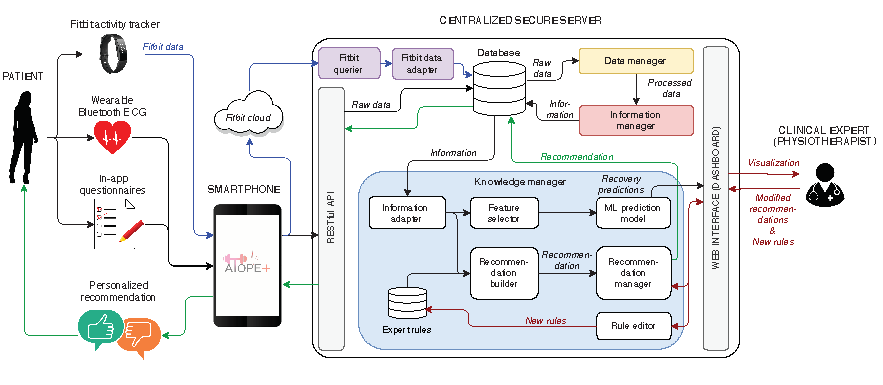
 Uncovering the relationship between mood and sport performance using context-aware mobile sensing [Dissertation]
Uncovering the relationship between mood and sport performance using context-aware mobile sensing [Dissertation]
By Carlos Bailon, University of Granada, Spain (February 2022)
* Thesis awarded with Cum Laude honors.
Understanding how the changes in our mood have an impact on the events and experiences that shape our daily lives is an essential task in affective science. This fact becomes even more critical in the area of sports since mood is widely recognized as a contributing factor to determining the performance of athletes. As mood fluctuations are strongly influenced by the context surrounding us, identifying the situations and behaviors that trigger these mood changes is crucial to optimizing the performance of athletes during practices and competitions. In this thesis, the use of mobile sensing and data science to explore the in-context mood fluctuations and their relationship with the performance of elite athletes is investigated. To that end, novel data collection systems and longitudinal analysis methodologies are proposed to overcome the limitations of traditional research approaches.
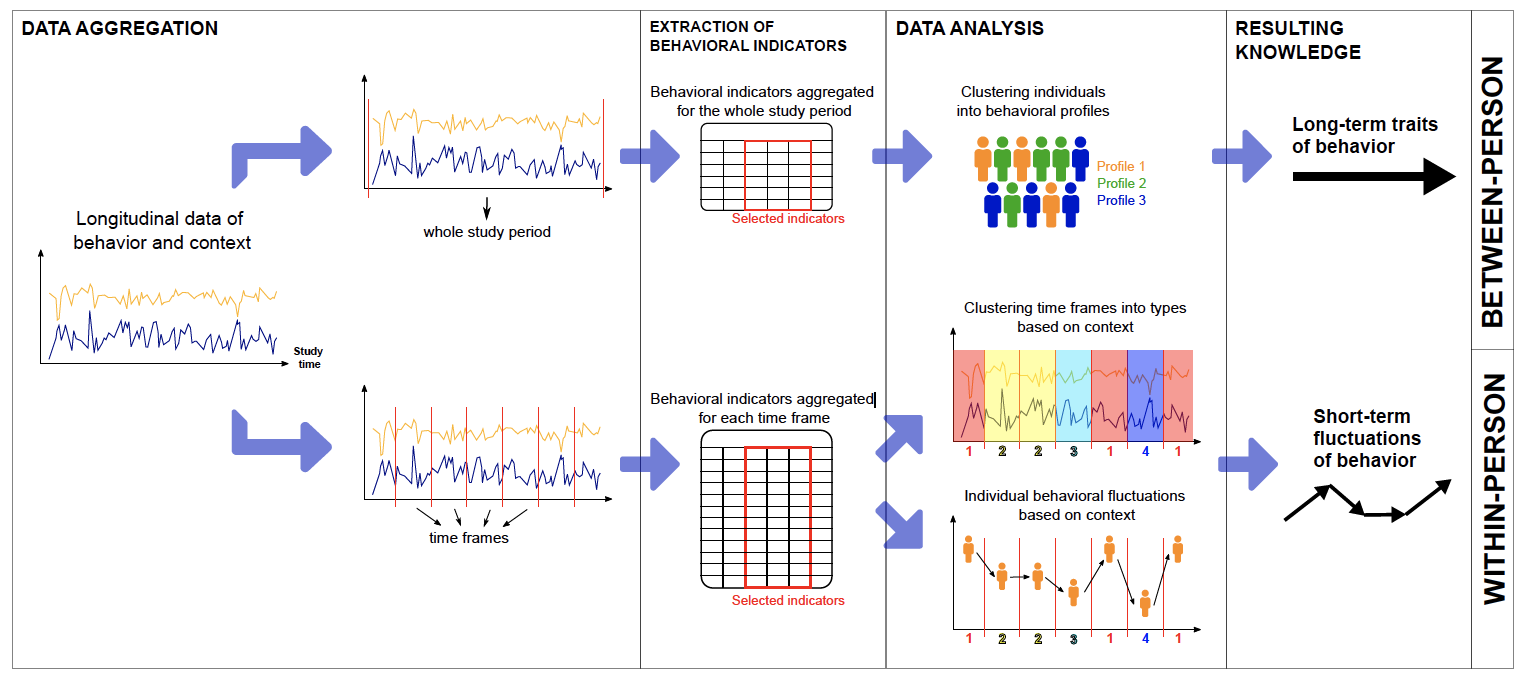
 Ontology Engineering and Reasoning to Support Real World Human Behavior Recognition [Dissertation]
Ontology Engineering and Reasoning to Support Real World Human Behavior Recognition [Dissertation]
By Claudia Villalonga, University of Granada, Spain (December 2016)
* Thesis awarded with Cum Laude honors.
Despite the popularity of human behavior recognition systems, most available solutions are developed to operate on predefined settings and fixed sensor setups. Real-world behavior recognition applications and users demand more flexible sensor configurations, which may deal with potential adverse situations such as defective or missing sensors. This thesis aims at exploring new ways for supporting seamless and reliable behavior recognition. This work revolves around the hypothesis that ontologies are the perfect means to comprehensively describe the available resources that could be utilized for human behavior recognition in the wild. Not only do ontologies provide interoperability, but this semantic representation of knowledge also enables, through ontological reasoning, the smart selection of the best resources that could provide behavior recognition capabilities in real world scenarios.
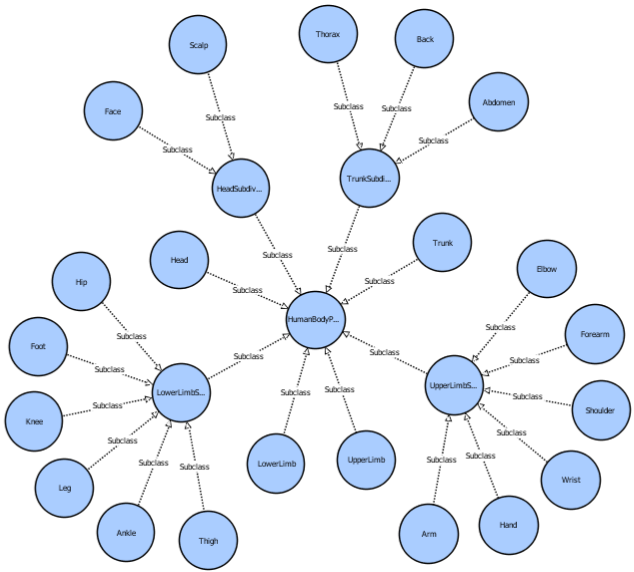
Master Theses
A digital tool to measure cognitive functioning from daily user-mobile interactions (SPA) [Dissertation]
By Guillermo Bueno, University of Granada, Spain (July 2022)
Cognitive diseases are rising worldwide as a consequence of the increased human life expectancy. This area requires innovative solutions to enable the early detection of symptoms of cognitive diseases, based on the collection of data obtained automatically and remotely to handle the increasing number of potential patients expected in the coming years. This project introduces a mobile and web-based platform that allows patients to perform cognitive tests on their mobile phone which are later assessed by mental health experts through a web-based dashboard.
Investigating technical aspects, usability aspects, and participatory willingness for an effective mobile data sensing study [Dissertation]
By Monique Te Rietstap, University of Twente, Netherlands (January 2018)
Mobile phones provide a myriad of data that can describe our every day behaviour. However, using them in experimental studies is normally not that straight forward. This thesis explores the technical and usability challenges behind mobile sensor data collection campaings. In addition, this work investigates the willingness of young adults to participate in mobile data sensing studies. A set of relevant guidelines is derived from the outcomes of this research in order to help designers to develop more effective mobile sensor data collection campaigns.
Development of an intelligent system to predict lower limb biomechanical injuries [Dissertation]
By Carlos Bailon, University of Granada, Spain (July 2017)
Lower limb injuries are the most common injuries among sport practitioners, specially those related to the knee and ankle joints. Consequently, it has appeared a growing interest in the identification of the risk factors for those injuries, leading to the common objective of predicting the injuries and avoid their appearance. This work presents a new marker tracking algorithm based on computer vision techniques for measuring knee injuries. The system has been tested on a professional football team and the data acquired have been analyzed using data mining techniques, in order to establish a first approach to a classification of the players in three levels of injury risk. It is also determined the most informative injury risk factors for its use in future analyses.
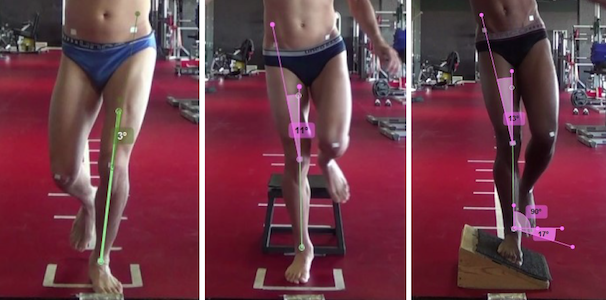
Mobile health system for evaluation of breast cancer patients during treatment and recovery phases [Dissertation]
By Joaquin Ollero, University of Granada, Spain (July 2016)
Breast cancer is the most common tumor in western women and statistically 1 out of 8 women will develop breast cancer over their lifetime. The rehabilitation the patient should follow after surgery is critical to recover from the suffered illness. In this work, a system composed of 3 applications, one for smartwatches, one for smartphones and a web application, is presented. Applications for handheld devices are directed to the patient who is undergoing rehabilitation and allow to monitor parameters of interest that will indicate whether the rehabilitation process being followed is improving the health of the patient. The web application is directed to a medical expert with the objective of tracking rehabilitation conducted by the patients.
 Development of an intelligent mHealth system to predict trunk endurance and muscle fatigue [Dissertation]
Development of an intelligent mHealth system to predict trunk endurance and muscle fatigue [Dissertation]
By Ignacio Reyes, University of Granada, Spain (July 2016)
* Project awarded with the Talentum Startup Grant (Telefonica, Spain) and the second prize in the VI UGR Entrepreneurial Contest (University of Granada, Spain).
This work extends a prior system for the automatic estimation of the trunk endurance using mobile and wearable sensors. Particularly, a new cloud-based storage and processing is proposed for the persistence and analysis of the data registered during the test sessions. Moreover, data mining techniques are implemented to identify correlations between the user activity, self-assessment and the endurance results. In addition, to verify the usefulness of the system, the endurance tests have been tested by the new developed system for a professional football team. This study especially aims to be the start point for the development of a new classification system of muscle activity for the lower back, based on the use of clustering and data mining in the new data generated by the application.
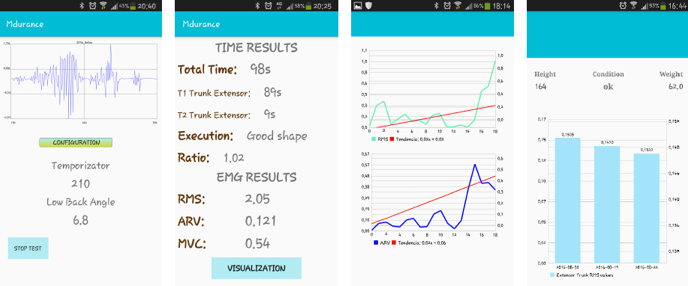
Development of a platform for the exchange of datasets with integrated opportunities for artificial intelligence using MatLab [Dissertation]
By Christian Wansing, University of Applied Sciences Muenster, Germany (July 2015)
Tons of datasets are increasingly available in many repositories, e.g., DATA.GOV, UCI or AWS. However, there is a clear lack of webtools that help automate the process of analyzing those datasets. This thesis contributes with a new user-friendly webtool especially oriented to support researchers in the analysis of existing and newly collected datasets. The website allows users to upload their datasets and share them with the community. The uploaded data can be analyzed through various methods and functions. Both raw and processed data can be represented through advanced visualization techniques. The tool implements several algorithms to create machine learning models with the uploaded data. Based on these generated models new data can be classified or predicted.
 An innovative clinical support system for trunk endurance assessment [Dissertation]
An innovative clinical support system for trunk endurance assessment [Dissertation]
By Ignacio Reyes, University of Granada, Spain (June 2015)
* Project awarded with honors and with the ETSIIT second prize to the best project in Telecommunications Engineering (University of Granada, Spain).
Low back pain is a primary cause of disability worldwide. Trunk endurance tests are normally considered to assess the muscle status; however, traditional procedures suffer from practical limitations leading to inaccurateness. This work developed mDurance, an innovative mHealth system to support specialists in the trunk endurance assessment. A wearable MIMU sensor is used to dynamically track the patient trunk posture to estimate the test duration, while portable EMG sensors are employed to seamlessly measure the muscle stress. The information is managed by an app facilitating the expert routine and minimizing human errors. The mDurance potential is shown through a case study. In order to show the potential of the mDurance system, a case study has been conducted. The results of this study prove the reliability of mDurance and further demonstrate that practitioners are certainly interested in the regular use of a system of this nature.
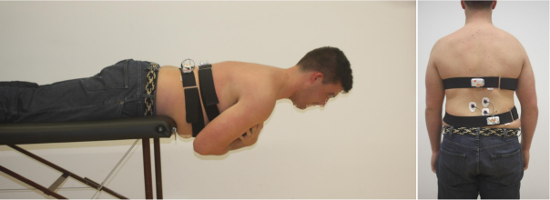
Automatic detection of on-body sensors location for opportunistic and robust inference of behavior [Dissertation]
By Marta Calles, University of Granada, Spain (February 2014)
Activity recognition models are normally based on predefined on-body sensor positioning. However, the sensor deployment may vary due to several conditions. User self-attachment, firmness of the attachment (loose of fitting) or displacements due to the use of the sensors may introduce variations with respect to the original setup. Furthermore, the accuracy of the recognition system may strongly depend on the particular body position considered for the mounting of the sensor. This project explores the effects that different sensor configurations/positions may have on the system recognition capabilities. Furthermore, this thesis presents new techniques that attempt to autonomously identify where a sensor is on-body located. This information is particularly interesting to adapt the recognition methods to the best sensor configuration at each time.
 mHealthDroid: a toolkit for rapid development of mHealth applications [Dissertation]
mHealthDroid: a toolkit for rapid development of mHealth applications [Dissertation]
By Alejandro Saez, University of Granada, Spain (December 2013)
* Project awarded with the Emilio Herrera Linares award to the best Spanish graduate research project (University of Granada, Spain).
Mobile health is an emerging field which is attracting much attention. Nevertheless, tools for the development of mobile health applications are lacking. This work presents mHealthDroid, an open source Android implementation of a mHealth Framework designed to facilitate the rapid and easy development of biomedical apps. The framework is devised to leverage the potential of mobile devices like smartphones or tablets, wearable sensors and portable biomedical devices. The framework provides functionalities for resource and communication abstraction, biomedical data acquisition, health knowledge extraction, persistent data storage, adaptive visualization, system management and value-added services such as intelligent alerts, recommendations and guidelines.
 Design, implementation and validation of a framework for agile development of mHealth applications [Dissertation]
Design, implementation and validation of a framework for agile development of mHealth applications [Dissertation]
By Rafael Garcia, University of Granada, Spain (December 2013)
* Project awarded with the Emilio Herrera Linares award to the best Spanish graduate research project (University of Granada, Spain).
The delivery of healthcare services has experienced tremendous changes during the last years. Mobile health or mHealth is a key engine of advance in the forefront of this revolution. Although there exists a growing development of mobile health applications, there is a lack of tools specifically devised for their implementation. This work presents mHealthDroid, an open source Android implementation of a mHealth Framework designed to facilitate the rapid and easy development of mHealth and biomedical apps. The framework is particularly planned to leverage the potential of mobile devices such as smartphones or tablets, wearable sensors and portable biomedical systems. These devices are increasingly used for the monitoring and delivery of personal health care and wellbeing. An exemplary application is also presented along this work to demonstrate the potential of mHealthDroid. This app is used to investigate on the analysis of human behavior, which is considered to be one of the most prominent areas in mHealth. An accurate activity recognition model is developed and successfully validated in both offline and online conditions.
Window size effect in activity recognition. Improving systems reliability through multi-segmented fusion (SPA) [Dissertation]
By Juan Manuel Galvez, University of Granada, Spain (September 2013)
Signal segmentation is a crucial stage in the activity recognition process; however, this has been rarely and vaguely characterized so far. Windowing approaches are normally used for segmentation, but there exists no clear consensus on which window size should be preferably employed. This work investigates the effects of the windowing procedure on the activity recognition process. To that end, diverse recognition systems are tested for several window sizes also including the values used in previous works. The study proves that reduced window sizes lead to a better recognition of the activities, which goes against the generalized idea of using long data windows. Moreover, this work explores the combination of multiple recognizers operating on different window sizes to optimize the recognition performance.
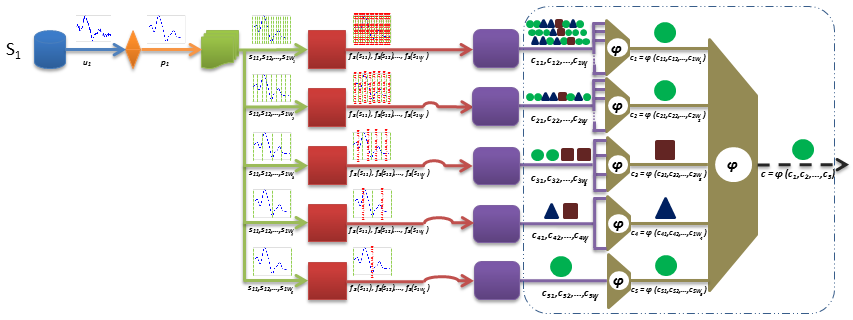
Android APP for biomedical monitoring [Dissertation]
By Hendrik Mende, University of Applied Sciences Muenster, Germany (October 2012)
The ever progressing technological advances on the development of mobile phones, medical sensors and wireless communication systems are supporting a new generation of unobtrusive, portable and ubiquitous health monitoring systems for a continuous patient assessment and a more personalized health care. In this paper we present PhysioDroid, an Android based application operated together with a wearable monitor capable of measuring vital information such as electrocardiogram (ECG), heart rate (HR), respiration rate (BR), skin temperature and motion directly from the human body. The application provides gathering, storage and processing features for the body sensor data. Likewise, the system works as a gateway enabling data transfer to a remote server which may be used for further processing and analysis. PhysioDroid also implements visualization of physiological information mainly intended to trigger alerts and emergency calls when abnormalities or risk situations are detected.
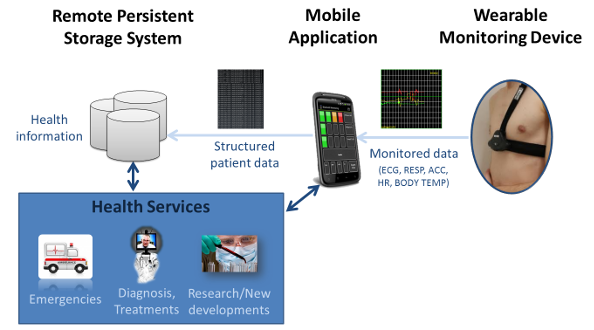
Development of an Android application for the monitoring, storage and upload of biomedical data [Dissertation]
By Andreas Hermes, University of Applied Sciences Muenster, Germany (October 2012)
There exist a growing number of mobile apps in the health domain; however, little contribution has been specifically provided, so far, to operate this kind of apps with wearable physiological sensors. This work contributes to the development of a new medical application that provides a personalized means to remotely monitor and evaluate users’ conditions. The system provides ubiquitous and continuous vital signs analysis, such as electrocardiogram, heart rate, respiration rate, skin temperature, and body motion, intended to help empower patients and improve clinical understanding. Based on the analysis of the user's vital sign and behavioral information the application can trigger personal alerts when abnormal situations are detected.
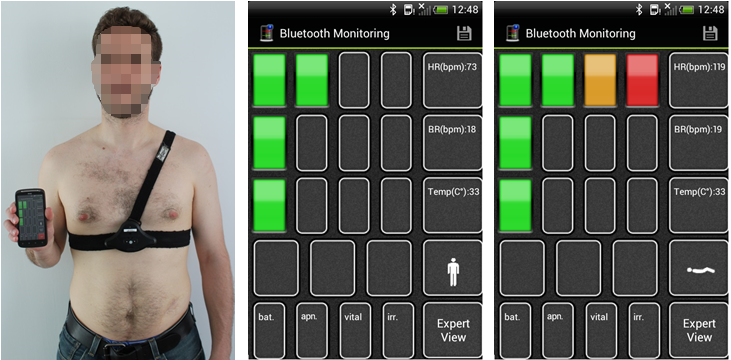
Signal preprocessing effects on daily living activity recognition systems (SPA) [Dissertation]
By Juan Manuel Galvez, University of Granada, Spain (September 2012)
Although much effort has been put in the development of valid activity recognition models, most related works do not regularly consider the preprocessing of the motion data. This work evaluates the effect of processing human inertial-sensing signals for diverse daily living activities. The findings of this study demonstrate that depending on the target activity set different preprocessing techniques should be considered.
Sensmotion: an APP for daily living activities monitoring (SPA) [Dissertation]
By Raul Nadal, University of Granada, Spain (September 2012)
The use of smartphones for the recognition of human activities has attracted much interest during the recent years. Smartphones are at the reach of most consumers, and as such, these devices are the perfect means for the development of realistic activity recognition applications. This work explores the use of the inertial sensors provided by standard smartphone devices to identify some of the most commonplace user activities.
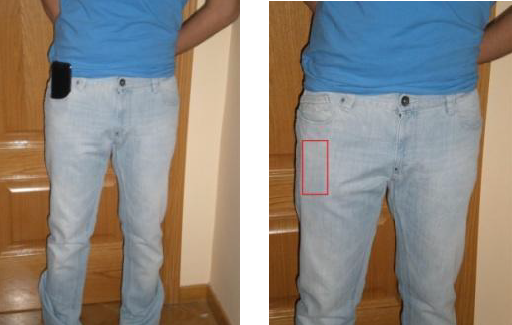
Human activity recognition based on an application for the Android operating system [Dissertation]
By Jens Ostrowski, University of Applied Sciences Muenster, Germany (September 2011)
Physical activity recognition is an area of growing interest given its multiple application domains. Although there exist several studies analyzing the potential capabilities of diverse recognition systems, there are few contributions exploring the use of smartphones for determining the user activity. A new application is developed to help recognizing the daily living physical activity of the user by using the available sensors in the smartphone. The application can collect lots of data from users all over the world. These data can be uploaded to a server to be analyzed in the future. With the help of this monitoring system we can find out more about the physical activity of the users and increase the accuracy of the application.
Bachelor Theses
 AI-CDT - Automatic assessment of clock drawing tests by means of artificial intelligence techniques (ENG) [Dissertation]
AI-CDT - Automatic assessment of clock drawing tests by means of artificial intelligence techniques (ENG) [Dissertation]
By Sergi Ruiz, University of Granada, Spain (September 2021)
* Project awarded with honors (University of Granada, Spain).
The number of people suffering from dementia is increasing worryingly, so specialists have to perform tests to detect and treat it as early as possible. One popular test is the Clock Drawing Test (CDT), in which the patient is given a score based on a clock they must draw. The evaluation of such drawing is often subject to human error, thus in this work a AI-based approach to evaluate the quality of the drawing is developed. The approach uses image processing, deep learning, and transfer learning techniques to automatically score a given drawing, yielding outstanding accuracy results.
Are-U-Drunk? Measuring alcohol intoxication via smart mobile sensing (ENG) [Dissertation]
By Cristina Diaz, University of Granada, Spain (September 2021)
The objective of this project is the detection of possible alcohol abuse to inform the user and facilitate better decision-making. For this purpose a digital eye movement detection system has been designed with which to detect involuntary movements caused by the effect of alcohol on the nervous system. The usability and performance of the developed application have been evaluated, proving the app to be useful, usable and practical.
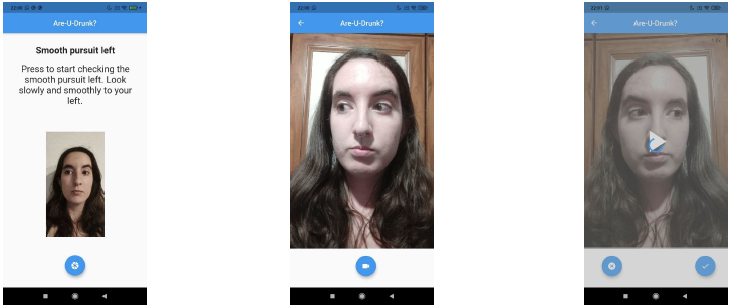
 IoT platform for the monitoring of physical activity in biohealthy parks (SPA) [Dissertation]
IoT platform for the monitoring of physical activity in biohealthy parks (SPA) [Dissertation]
By Pablo Rubio, University of Granada, Spain (July 2021)
* Project awarded with honors (University of Granada, Spain).
The use of outdoor fitness parks is increasing, however very little is known about how much these are used. This project designs and implements a device that can be installed in the fitness equipment of the outdoor fitness parks to monitor the usage of the equipment. Internet of Things platforms and communications are combined with diverse sensor technology to visualize and evaluate the use of the park.
Digitalisation of a factory within the Industry 4.0 context (SPA) [Dissertation]
By Andres Garcia, University of Granada, Spain (July 2021)
This project presents a solution to the current problem of accumulation of biological waste around hospitals due to COVID-19. To do this, a plant is simulated with an industrial simulator, being its design based on the disinfection processes required by the equipment. This plant is automated via a PLC and through a SCADA system, supporting remote control and supervision.
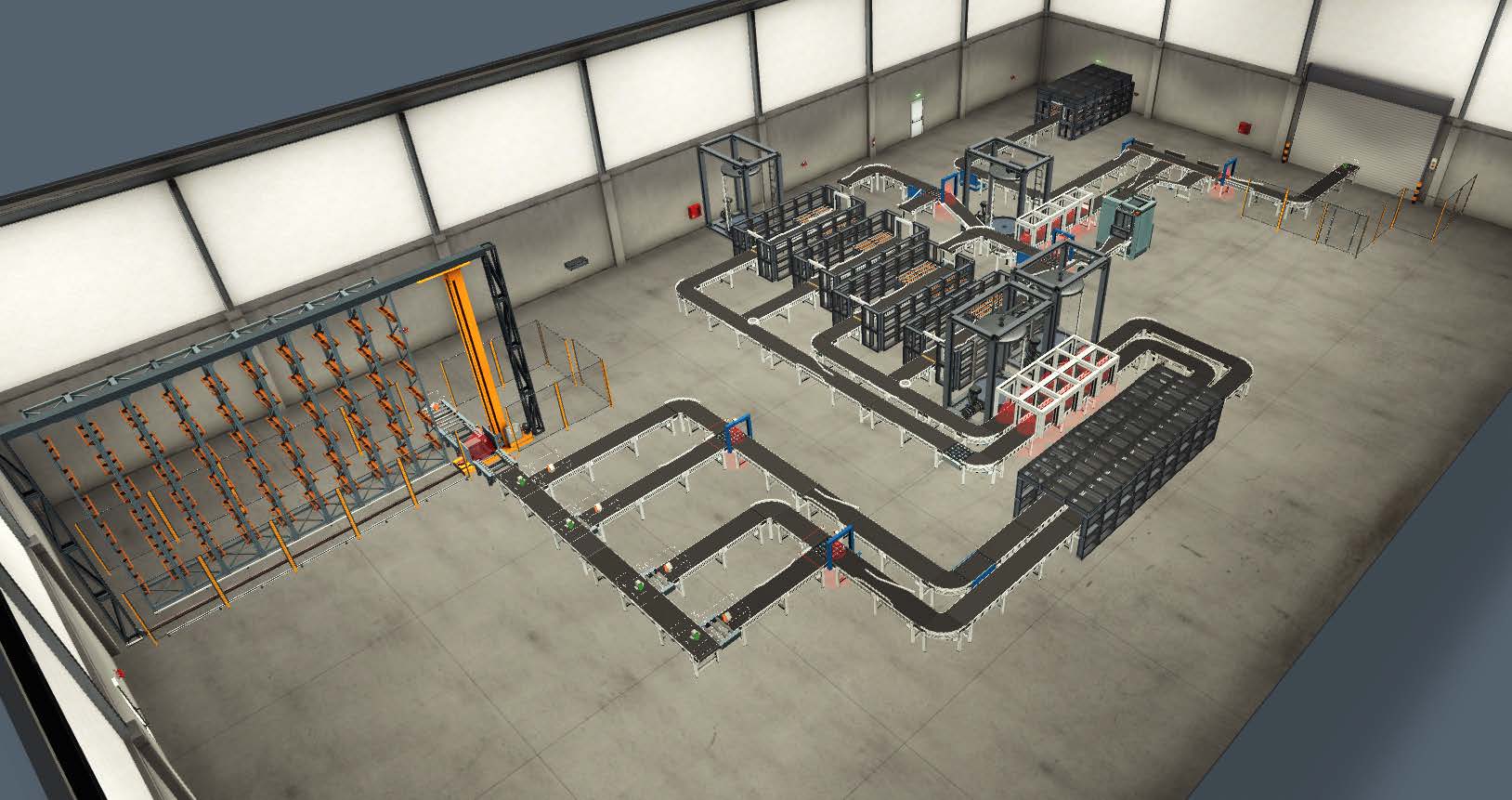
ACTITRANSFER: Instructing IoT sensors for activity recognition via transfer learning (SPA) [Dissertation]
By Adrian Sanchez, University of Granada, Spain (November 2020)
Activity recognition has attracted much attention during the last years. While many solutions have been proposed in the literature, most of them require to retrain the recognition system every time the sensor setup changes. This work explores the use of deep learning techniques to transfer the recognition capabilities from an existing system to a newcomer system.
EMOMOBILE: Automatic detection of emotional behaviour from daily user-mobile interactions [Dissertation]
By Francisco Lobon, University of Granada, Spain (September 2020)
This work presents a system consisting of a mobile application and a web application to facilitate the remote, continuous, and ubiquitous monitoring of some parameters related to mental disorders. An initial evaluation of the usability of the system has been carried out with several participants.
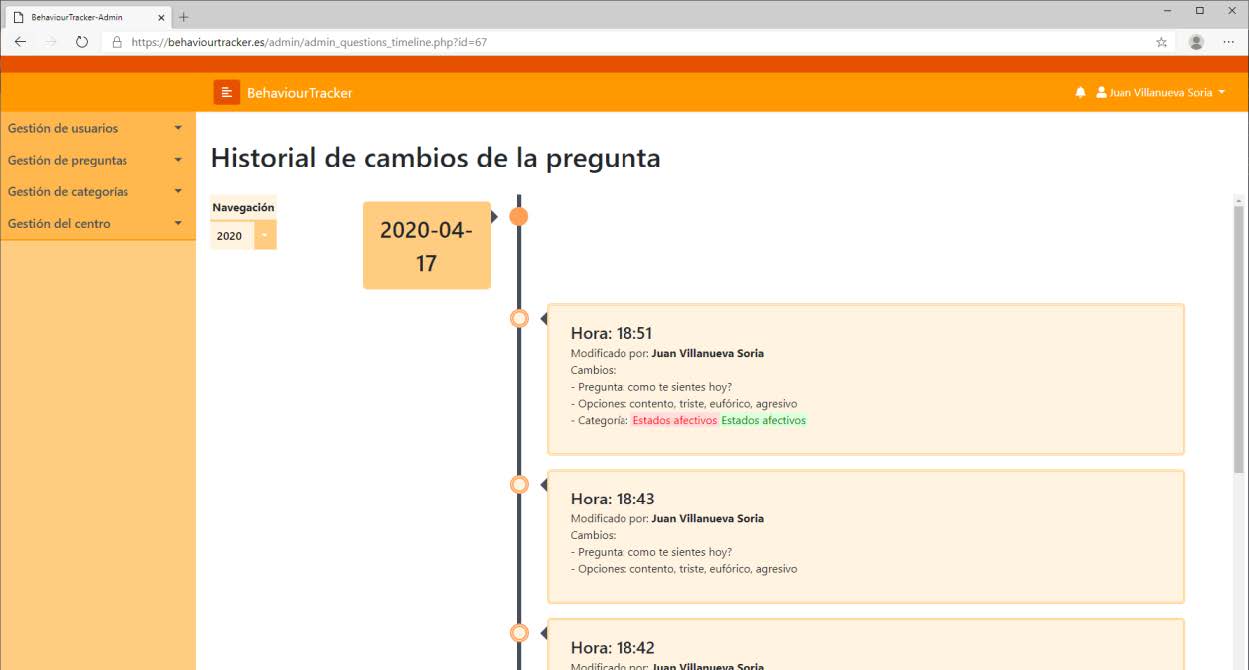
On the use of conversational agents to measure caregiver burden [Dissertation]
By Eugenia Castilla, University of Granada, Spain (September 2020)
As mental health disorders keep on affecting more people world wide, more families see themselves as caregivers. Most of the times, these family members have not received a proper training and find themselves struggling to make ends meet, experience loneliness, abandonment, and often develop signs of depression. All the symptoms described can be summarized in what is called the caregiver burden syndrome. The attention given to these caregivers is scarce, but the technology of nowadays offers a new opportunity to provide help and attention to caregivers. This project develops a conversational agent to measure caregiver burden through psychological digital test questions asked as an easy going conversation takes place.
WATCH-YOUR-ARM: Tracking your gym arm activity through smartwatch technologies (SPA) [Dissertation]
By Andres Lopez, University of Granada, Spain (September 2020)
This work develops a wearable system that recognizes the beginning and end of regular gym exercisse during anaerobic training. The system consists of a smartwatch application that records the inertia of the arm movements and a mobile application that analyses the collected data and visualises different parameters descring the quality of the performed exercises.
Python-based application for performance improvement of throwing sports using surface electromyography (SPA) [Dissertation]
By Alberto Herrera, University of Granada, Spain (September 2020)
The use of electromyography in sports performnace is becoming quite popular. However, the analysis of these signals is not always at the reach of most medical experts. Specific technological knowledge is often required which these specialists usually lack. This work presents a web application divided that allows to analyse the signals in a much simpler way, including regular statistical analysis.
Design and integration of a classification system of movement disorders in patients with knee injuries (SPA) [Dissertation]
By Juan Manuel Lopez, University of Granada, Spain (September 2020)
Surface electromyography is playing an important role for supporting physiotherapists and experts in general to analyse athlete's performance as well as to detect possible muscular problems while they perform some activity. This work applies machine learning techniques to particularly differentiate between fatigue and non-fatigue states from the registered electromyography signals.
 HOW-R-U? Suite of e-coaches aimed to analyse human behaviour [Dissertation]
HOW-R-U? Suite of e-coaches aimed to analyse human behaviour [Dissertation]
By Carlos Sanchez, University of Granada, Spain (July 2020)
* Project awarded with honors (University of Granada, Spain).
Nowadays mental ilnesses are still difficult to treat and diagnose. Moreover, they are associated to a stigma, thus patients most often do not feel comfortable while requesting profesional help. The aim of this project is to develop an e-coaches suite based on chatbots, specifically a mental health chatbot that would help to the premature diagnostic of mental illnesses such as anxiety and depression.
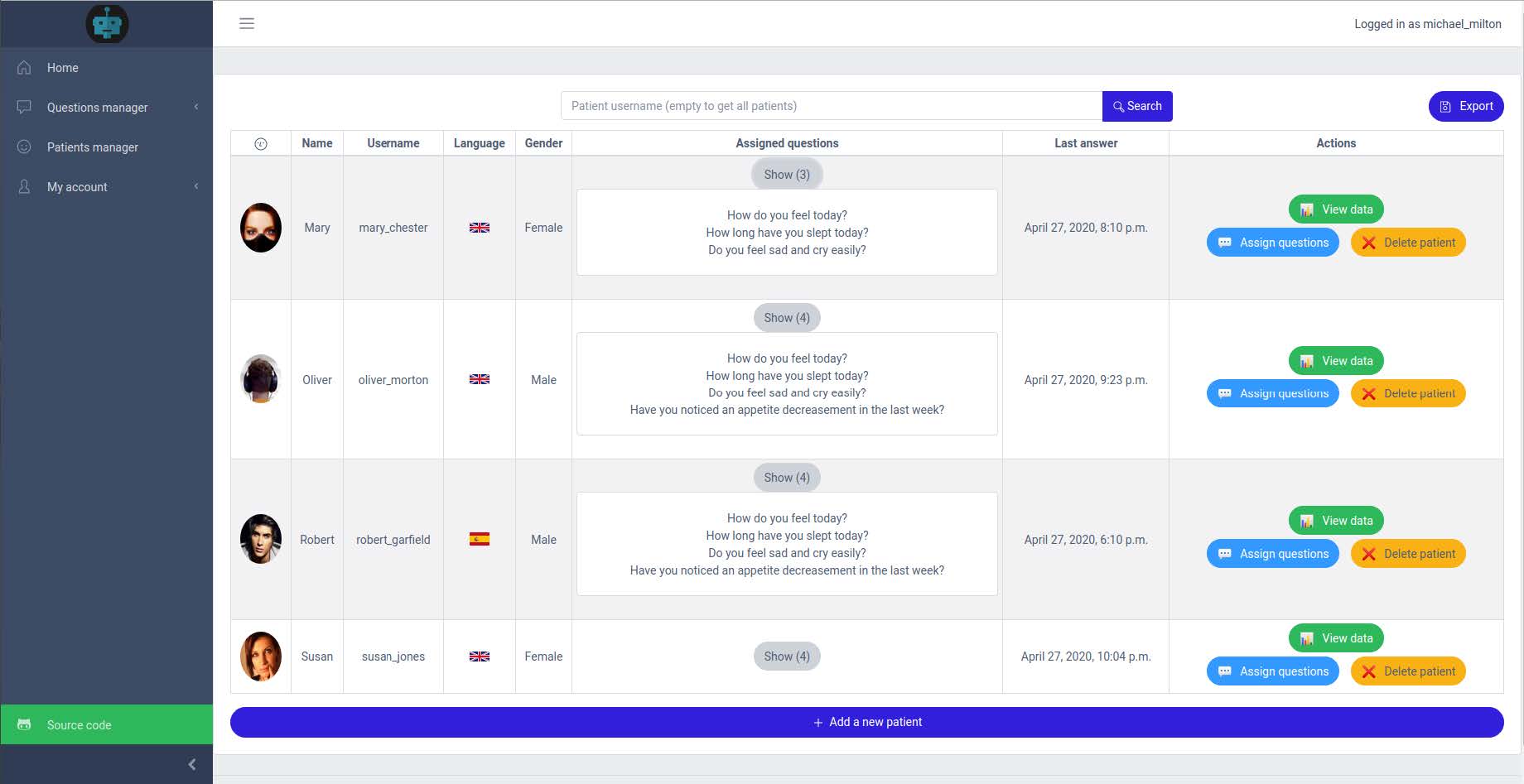
COGNIMOBILE: automatic detection of cognitive functioning from daily user-mobile interactions [Dissertation]
By Guillermo Bueno, University of Granada, Spain (July 2020)
Cognitive diseases are affecting every day more people worlwide. The increased human life span is a consequence, among others, of more accessible and better health systems, which is favouring the surge of ageing-related pathologies. This area needs more research based on innovative monitoring systems which can detect these conditions in an early stage. This project introduces an interactive open platform that allows the self-assessment of users via digital cognitive tests that are performed on a mobile device.
IoT platform for remote monitoring in nursing homes (SPA) [Dissertation][Dissertation]
By Francisco Guerrero and Ruben Torres, University of Granada, Spain (July 2020)
This project presents an ambient sensing monitoring system particularly targeted at nursing homes. The system consists of a comprehensive sensor ecosystem, a backend for the gathering and aggregation of the sensor data, and a monitoring panel that displays information on the state of each room. Among other applications, the system implements a fall detection system in addtion to other alerts to easily detect abnormalities to facilitate the supervision of the inhabitants.
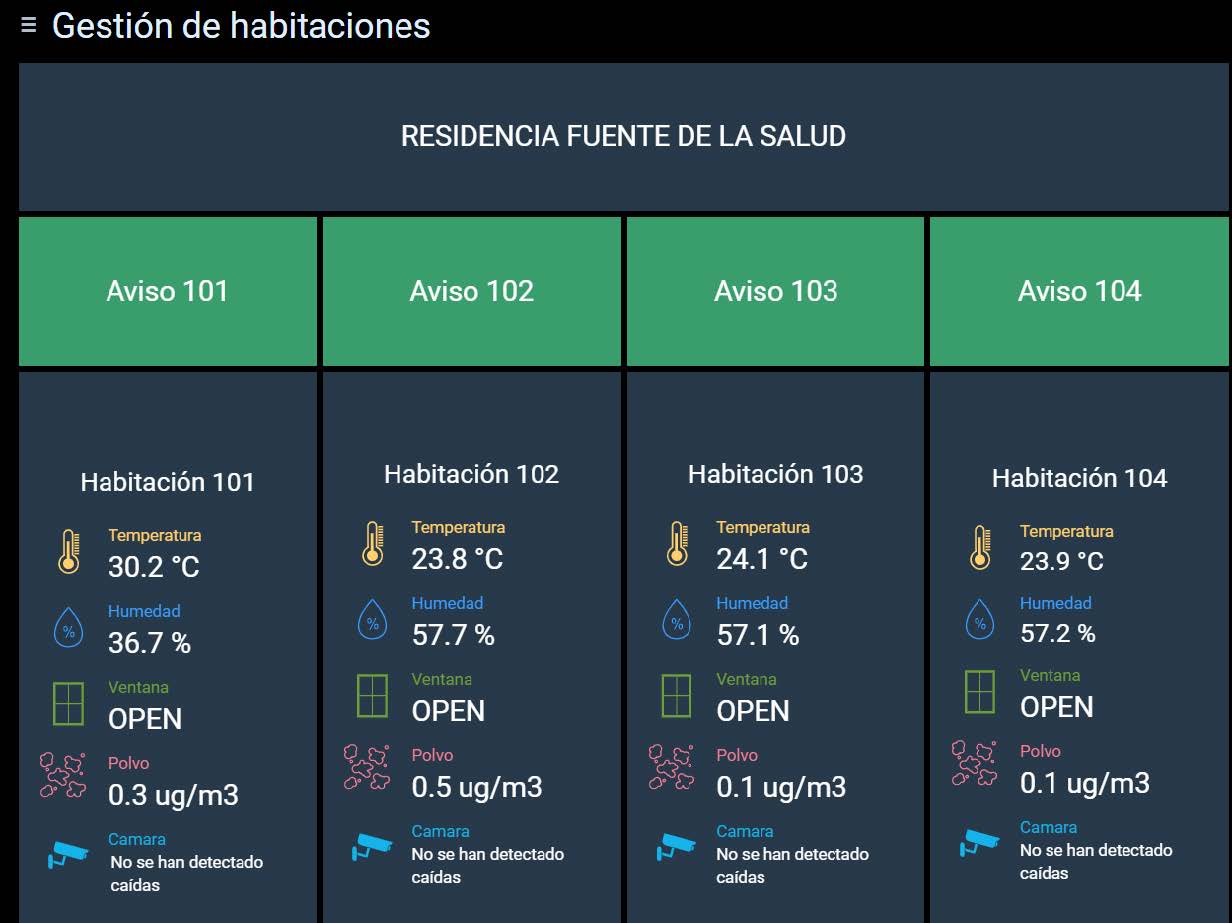
 Design and implementation of an automated factory in the context of Industry 4.0 (SPA) [Dissertation]
Design and implementation of an automated factory in the context of Industry 4.0 (SPA) [Dissertation]
By Carlos Lanzas, University of Granada, Spain (July 2020)
* Project awarded with honors (University of Granada, Spain).
This work develops an automation and control system of a given factory. To that end, the project uses an intelligent factory development framework that allows the recreation of industrial environments in a clear and intuitive way. A mobile application is also developed to allow the execution, communication, and display of commands, as well as a web server to allow remote access to the SCADA system to control and supervise the plant from anywhere.
Intelligent mobile notification system to prevent distracted driving (SPA) [Dissertation]
By Clemente Irigaray, University of Granada, Spain (November 2019)
Smartphones are nowadays a major source of distraction while driving. This project presents a smart system based on mobile technologies capable of acting by the user on certain occasions in order to try to reduce these distractions. The system collects contextual information about the user, accessing its calendar, its location and external information (e.g., wheather conditions). The system can then detect the situations in which the user is late for an event but cannot use the mobile phone because he is driving, and act accordingly, notifying the participants of the event the user’s delay.
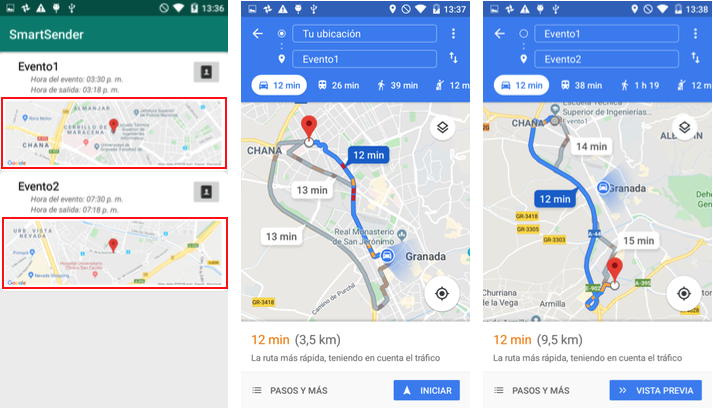
EMG wearable device for health applications (SPA) [Dissertation]
By Ignacio Arenas, University of Granada, Spain (June 2019)
The use of electromiography (EMG) in sports and health-related applications has boomed recently in view of its multiple applications. This work presents a new wearable EMG prototype covering acquisition, processing and transmission of the electrical signal generated by the muscles in order to diagnose and treat neuromuscular diseases or injuries.
 Simulation, automation and supervision of Industry 4.0 processes (SPA) [Dissertation]
Simulation, automation and supervision of Industry 4.0 processes (SPA) [Dissertation]
By Miguel Molina, University of Granada, Spain (June 2019)
* Project awarded with honors (University of Granada, Spain).
This work presents the complete development cycle in the automation of an industrial process. To that end, a very intuitive and visual 3D simulation program of industrial plants is used. The developed factory can adapt to the changing flow of demand optimally, reducing working times and prioritizing urgent orders.
mCoach: mobile coaching for health applications (SPA) [Dissertation]
By Jose Manuel Rodriguez, University of Granada, Spain (September 2018)
Many people are affected by health problems and encounter difficulties receiving the correct treatment. This stems from the fact that some problems need long-term treatments and, sometimes, people are unable to follow them through. One effective way to assist patients is to use devices present in everyday life such as smartphones or smartwatches. E-coaching systems are used to assist patients by adapting to their specific case. These systems are able to provide treatment and learn from a user to improve assistance by collecting a variety of data seamlessly. The goal of this work is to investigate models of behaviour change, which are important parts of e-coaching systems, and to design a digital model to be integrated in a mobile coaching application.
Using mobile sensing to detect indicators of alcohol intoxication [Dissertation]
By Boris Das, University of Twente, Netherlands (July 2018)
Alcohol abuse is a leading cause of preventable deaths. Thus, a tool that may help us prevent alcohol abuse and aid in reducing alcohol use can be very beneficial for the world population. This work explores the use of mobile sensing to detect indicators of alcohol intoxication. The system particularly analyzes keyboard logs in order to determine the level of intoxication of the user.
SmartMoments: Using Smart Devices to Tag and Cluster "Personal Moments" in Daily Life [Dissertation]
By Sun Ok, University of Twente, Netherlands (July 2018)
In our daily life, there are brief periods of time that are triggered by different physical, physiological and mental responses. Some of these brief periods are memorable and carry importance for each individual. They can be defined as a special or personal moment and differ from person to person, which means every individual has a different way of experiencing the world and communicating differently. This work explores the possibilities offered by smartphones to tag these special moments in an individual’s life.
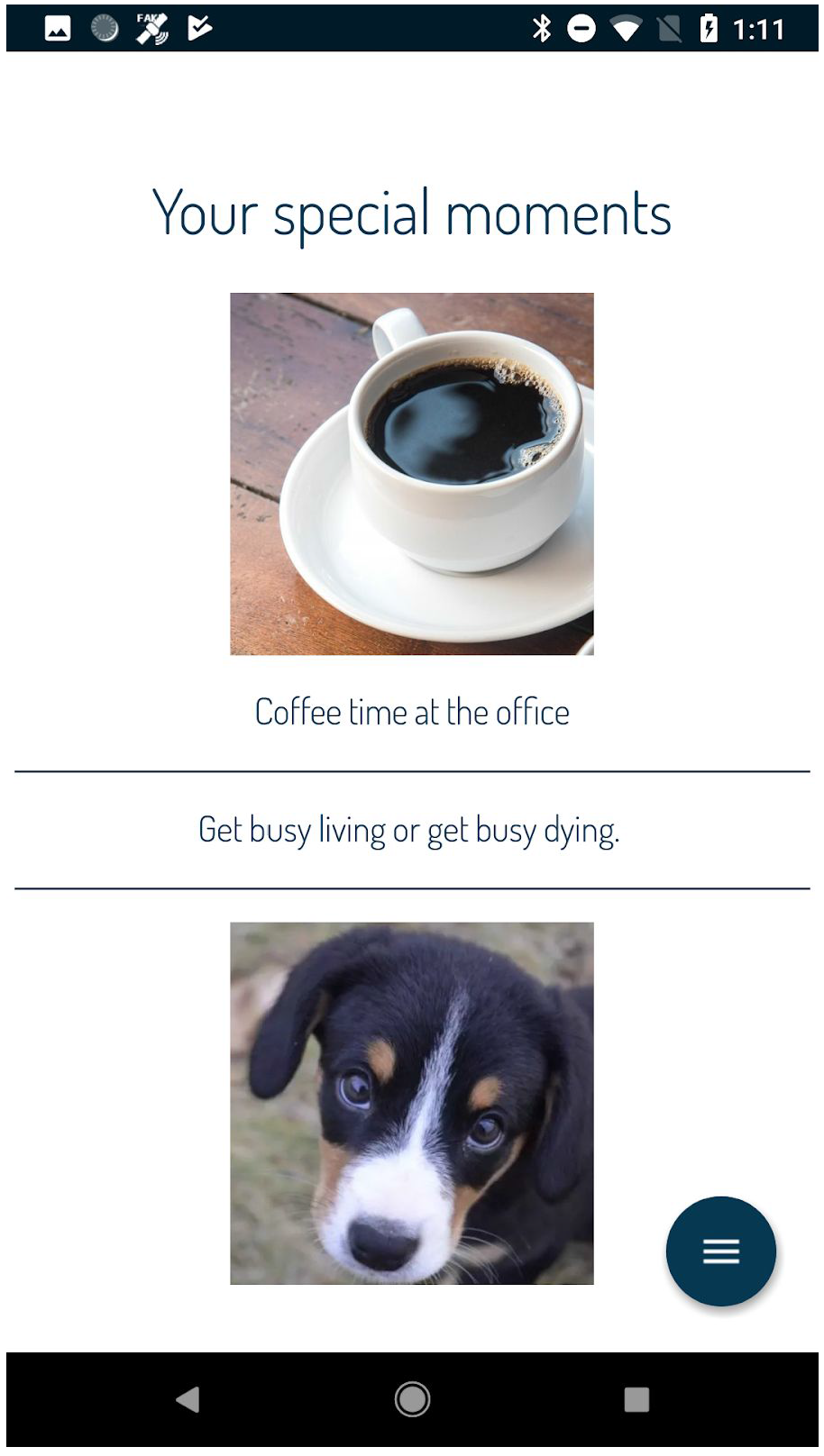
Improved reminder system to stimulate medication adherence of elderly at home as well as outdoors with the use of the Medido medicine dispenser [Dissertation]
By Laura van der Neut, University of Twente, Netherlands (July 2018)
Effective drug reminders have to work both at home and outdoors to prevent non-adherence to medication. This work studies the limitations of existing solutions and presents an alternative based on a smart pill bottle, largely preferred by surveyed users (elderly and caregivers) rather than mobile phone or smartwatch apps.
CogniDecline: tracking mobile interaction for cognitive assessment [Dissertation]
By Jan Wohlfahrt-Laymann, University of Twente, Netherlands (July 2017)
With the rapidly ageing population, mental disorders associated to ageing are becoming more prevalent. Cognitive impairments, such as dementia, can cause severe problems in daily life. Currently diagnosis of cognitive impairment is performed through medical assessments after potential symptoms have been detected. Digital approaches can provide more immediate and continuous assessment which could allow for much earlier diagnosis of mental disorders. This work develops and explores the use of smartphone-based cognitive experience sampling techniques based on the digitalisation of standardised clinical cognitive assessment tests.
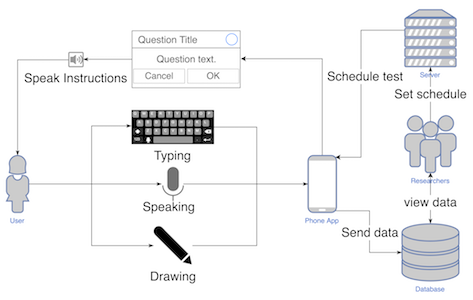
Using technology to recognise emotions in autistic people [Dissertation]
By Tamara Notenboom, University of Twente, Netherlands (July 2017)
Autistic people express their emotions in a special way, which makes it hard for others to interpret them correctly. This is especially troublesome for autistic children, whose parents have difficulty reading their emotions. The different expression of emotions by autistic people influences affective signals, which makes technology based on facial recognition, body language or voice intonation unreliable. Sensors for these affective signals can be placed in a variety of products, but these products should adhere to specific design guidelines based on user requirements of the target group, which is sensitive to stimuli and has difficulty adapting. This work elaborates on this user requirements by creating a set of guidelines for designing sensors to measure affective signals from autistic children.
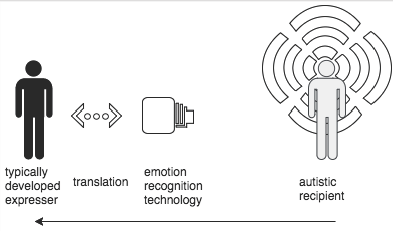
Safe cycling for elderly: see [Dissertation]
By Lukas Bos, University of Twente, Netherlands (July 2017)
Twenty one million bicycles, including electric bicycles, are sold every year in Europe. A bicycle is a useful vehicle that can be used by all age groups. However, it appears that elderly cyclists have a higher risk of getting injured in traffic. Statistics show that elderly people have a very large risk of getting involved in a cycling accident as compared to other age groups. In this research the technical possibilities of smartphones and mobile sensors are explored with the aim of helping elderly cyclists in traffic.
Traceability of medical equipment through hospitals and retirement homes [Dissertation]
By Dennis Rieffe, University of Twente, Netherlands (February 2017)
Staff working in healthcare and retirement homes frequently face high workloads and accordingly high stress levels are reported by healthcare personal. In hospitals and nursing homes valuable time is lost while searching for medical devices and supporting aids like lifts or beds. Another disadvantage of lost equipment is that the required maintenance is not conducted at the time of need. A system that easily tracks and finds such devices would save valuable time and accordingly would reduce the work stress of healthcare staff and improve the quality of work. This thesis describes the feasibility study of a simple and low cost tracking system for medical devices based on existing IT infrastructure available in every hospital and retirement homes nowadays: A Wi-Fi network. An indoor Wi-Fi fingerprint system was developed, tested and evaluated. This study has shown that a tracking system based on Wi-Fi position is feasible.
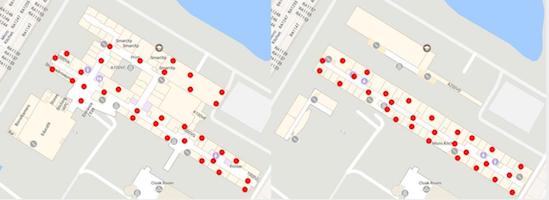
 Automatic estimation of knee alignment based on depth video [Dissertation]
Automatic estimation of knee alignment based on depth video [Dissertation]
By Carlos Bailon, University of Granada, Spain (July 2016)
* Project awarded with honors (University of Granada, Spain).
Knee alignment measurements are one of the most extended indicators of knee-complex injuries such as anterior cruciate ligament injury and patellofemoral pain syndrome. The Frontal Plane Projection Angle (FPPA) is widely used as a 2-D estimation of knee alignment. However, traditional procedures to measure this angle suffer from practical limitations, which lead to huge time investments when evaluating multiple subjects. This thesis presents a novel video analysis system aimed at supporting experts in the dynamic measurement of the FPPA in an cost-effective and easy way. The system employs the Kinect V2 depth sensor to track reflective markers attached to the patient leg joints to provide an automatic estimation of the angle formed by the hip, knee and ankle joints. Information registered by the sensor is processed and managed by a computer application that simplifies the expert’s work and expedites the analysis of the test results.
Incorporating a crutch into gait rehabilitation floor data [Dissertation]
By Ruben van den Berg, University of Twente, Netherlands (July 2016)
The goal of this project was to enable a larger patient group to exploit the gait rehabilitation pressure sensitive LED floor “Black Spinel”. This project involves the integration of a crutch into the Black Spinel. A prototype including a force sensitive resistor and Bluetooth module has been developed. The prototype was tested on the Black Spinel. A clear distinction was seen when steps were made on the floor as well as on the crutch. Future research might further explore the addition of a second crutch, improve calibration and filter out phantom measurements.
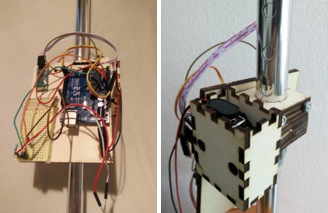
 Automatic performance status evaluation and physical activity recognition in cancer patients for medical diagnosis assistance [Dissertation]
Automatic performance status evaluation and physical activity recognition in cancer patients for medical diagnosis assistance [Dissertation]
By Salvador Moreno, University of Granada, Spain (July 2016)
* Project awarded with a Graduate Research Assistantship (University of Granada, Spain).
The evaluation of cancer patients’ recovery is still subject to great subjectivity from a clinical perspective. Many different systems have been successfully implemented for physical activity evaluation, nonetheless there is still a big leap into performance status evaluation with ECOG and Karnofsky’s, which are possibly the most widely-used performance status scores. This thesis presents a novel system for automatically recording the patient's activity and derive these scores by using a smartphone and smartwatch. A gamification approach has also been designed for increasing patients’ motivation in their recovery. Furthermore, unprecedented algorithms for performance status and physical activity assessment have been developed to help oncologists in their diagnoses.
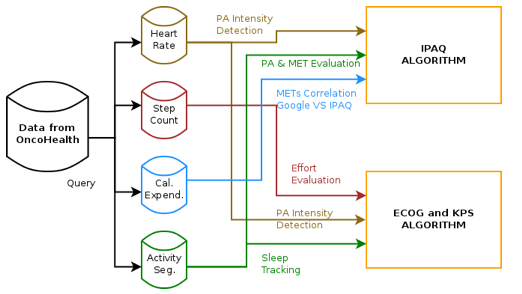
Master Theses (Education)
Using virtual assistants in the classroom as a complementary resource in teaching. (SPA) [Dissertation]
By Marisol Perez, University of Granada, Spain (June 2020)
This work investigates the effectiveness of the responses generated by smart speakers such as Google Nest or Amazon Echo when used in the classroom. The research was conducted with real students and it showed that the utility of this kind of virtual assistants is limited when it comes to providing valid answers to the questions posed by the students. The students' perception of the usefulness of these assistants in resolving their queries is quite homogeneous, and although it is considered generally positive, in many cases the provided answers were not clarifying enough.
Study of the influence of the Spanish lockdown on students, parents and teachers in secondary school, high school and vocational training. (SPA) [Dissertation]
By Rosa Perez, University of Granada, Spain (June 2020)
This educational research studies how the COVID-19 pandemic and the confinement affected students, parents, and teachers in secondary school, high school and vocational training. Such confinement resulted in students and teachers being forced to suddenly shift to an e-learning model. This unexpected situation posed great challenges and difficulties that affected their stress, motivation and learning. Questionnaires and interviews are used to pulse the feelings and perceptions of students, parents, and teachers to understand the overall impact.
Intelligent textiles and clothing recycling (SPA) [Dissertation]
By Josefa Jimenez, University of Granada, Spain (June 2020)
Sustainability has become a central aspect in our society. This project aims at improving the environmental awareness of students through the recycling of clothing. Students are invited to redesign their recycled garment providing it with another use different from the one they initially had. The proposed activities involve the embedding of electronics into the garments to transform them into the so-called e-textiles.
Augmented reality as a tool to improve spatial vision in high school students (SPA) [Dissertation]
By Antonio Jose Moreno, University of Granada, Spain (June 2019)
Spatial vision is usually not trained explicitly in class. Thus, in turn, some students can show deficiences and development problems for this skill. This work proposes the use of augmented reality to compensate such deficiencies. The work analizes various augmented reality online platforms and uses one of them in a real classroom. A preliminary study of the spatial vision level of the students before and after the use of the proposed system is shown, also accounting for the perceptions (usability, possible obstacles to its use, motivation, etc.) of teachers and students on the use of augmented reality.
Using social media to increase the involvement of families in education (SPA) [Dissertation]
By Joaquin Cazalilla, University of Granada, Spain (June 2019)
The involvement of families in the academic education of their children has been shown to improve their academic performance. Developing a more active and collaborative attitude towards schools can result in better learning in our students and therefore a considerable improvement of our education system. This work presents an example of how to use social media to educate families (mostly parents) of high school students. The idea is to provide all families of a given course with a quick summary after every lesson explaining the main concepts addressed and the homework to be done (some in collaboration with the family members).
Preliminary study on the use of virtual assistants to aid teachers with lessons' time management (SPA) [Dissertation]
By Blas Rascon, University of Granada, Spain (June 2019)
This study researches the use of voice-driven virtual assistants to facilitate the teaching process, namely the management of time during lessons. An educational research study was carried out, developed on three professors of the Technology Department and 28 students of the robotics course of a high school. The work shows that teachers find the use of virtual assistants both useful and beneficial for a better control of the cadence of time in class and to develop their digital skills as teachers. Students also consider that the use of virtual assistants in the classroom improves time management and can be a useful tool to develop their digital skills as citizens.
Digital response systems - challenges and perceptions towards its use in high school (SPA) [Dissertation]
By Francisco Alberto Pinteno, University of Granada, Spain (June 2019)
This work presents a brief educational research on the current perception of the use of real time digital participation methodologies in the classroom via student response systems (SRS) and the difficulties arising from their implementation in a public secondary school in Andalusia. Given the low level of practical use of these methodologies and the general prohibition of the use of mobile devices by students in this type of educational centers, activities and surveys have been carried out to analyze the preferences of 29 teachers and 100 students with regard to participation methods and the use of electronic devices. The results show a positive perception towards the use of these innovative techniques, which are hindered by the lack of knowledge on the differences between the available tools and the disadvantages they pose in teaching activities as opposed to the high motivation and interest they generate in the students.